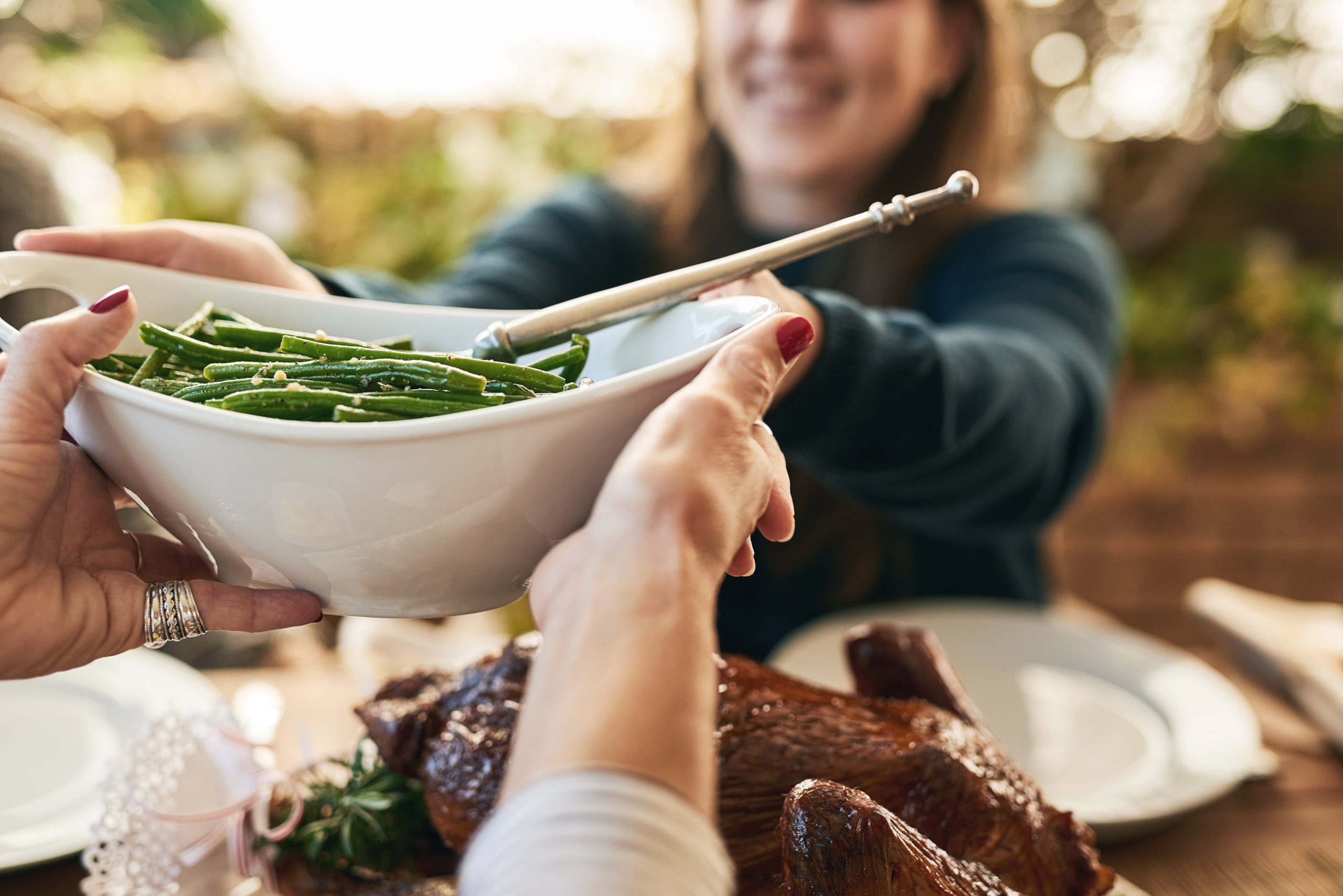Temptation is ever-present during the holidays. Stick to your goals (even if you slip a little) with these simple tips to minimize the impact of holiday indulgence.
More than any other time of the year, the holidays have a way of testing our resolve.
Suddenly, everywhere you look there’s another tray of homemade fudge or a tin of smiling gingerbread cookies (does it seem like they’re mocking you?)…
Every gathering becomes an excuse to eat more food than you’d normally eat in a day. (Seriously, when did the holidays turn into a giant food-fest?!)…
And as the party invites pile up, the pounds pile on… because who has the willpower to resist all that yummy holiday goodness?
That is, until you find yourself halfway through December wondering why your pants feel so snug and hoping that New Year’s Eve dress you bought still fits in two weeks.
Fear not!
With these simple, easy-to-implement strategies, you can get back on track to being the best fat burner… even if you’ve already indulged a little this season.
Burning fat instead of sugar can help you drop weight fast, and it keeps you in power weight-loss mode so your body works with you—not against you!—to lose weight and stay lean.
The New Year is just around the corner, so let’s dive in…
Double up on protein shakes.
I know I’ve said this before, but it’s worth repeating! Especially on days when you know you’re going to indulge—the office holiday party, your annual family dinner (aka food-fest!), or your bestie’s New Year’s Eve bash—do yourself a favor and double up on your protein shakes earlier that day.
The I-just-won’t-eat-all-day strategy is not the answer. Instead, break your fast in the morning with a breakfast smoothie (try to wait until 9 or 10 a.m.) and then have another protein shake for lunch around 2 or 3 p.m.
You’ll arrive at your gathering with an appetite, but you won’t be so famished that you’re diving fork-first into the crostini with goat cheese and cranberry brie bites.
Sleep well, stress less.
I know this is easier said than done during the most hectic season of the year. But when you’re not sleeping well, you’re depriving your body of the chance to be the best fat burner.
Studies show that not getting enough sleep lowers leptin, the hormone that tells your brain to stop eating. Poor sleep also cranks up your hunger hormone, ghrelin, which makes you more likely to store body fat. (1) Add to that a heaping helping of holiday stress, and you can say good-bye to a good night’s sleep.
Getting 7–9 hours of quality sleep each night can help you be the best fat burner! My brand new Best Rest Sleep Cheat Sheet gives you my favorite strategies to fall asleep and stay asleep. Get your guide FREE here.
Not only can stress crash your sleep, but too little sleep (or poor-quality sleep) in turn ramps up stress levels, creating a vicious cycle. (2) Prolonged stress also fuels inflammation and the risk of serious health issues that go along with it. (3)
To help keep your stress levels in check during the holidays, try simple strategies such as yoga, meditation, aromatherapy (I’m a big fan of lavender oil!), exercising (taking the dog for a walk or getting in a quick burst training routine are two great ways to stay active), spending time outdoors, and gratitude journaling. Listen to this podcast for more simple strategies to manage stress.
Follow the golden rules of meal timing.
What you eat matters, but so does when you eat. In other words, the timing of your meals can either set you up to burn fat or store it away. If you want to be the best fat burner over the holidays and all year long, here’s how meal timing should look:
Start your morning with a protein shake. (Find out how to make the perfect shake here.) Studies prove that people who eat breakfast are less hungry and have fewer cravings throughout the day. (4) When you have your morning shake depends on whether or not you’re fasting. If you can, push it until 9 or 10 a.m.
After that, eat by the Plate every 4–6 hours. Stop eating about 3 hours before bedtime. Have a glass of water before bed if you need to curb hunger.
“Our cells cannot make and break up body fat at the same time,” says Dr. Satchin Panda, author of The Circadian Code. “Every time we eat, the fat-making program turns on and the cells in our liver and muscles create some fat and store it. The fat-burning program slowly turns on only after the organs realize no more food is coming their way, and that takes a few hours after your last meal. And it takes a few more hours to deplete a good portion of stored body fat.”
Keep a food journal.
It can be super challenging sticking to your healthy goals during the holiday season, when temptation seems to be lurking around every corner. Food journaling can help you stay on track and troubleshoot any glitches that come up along the way.
Not only are you less likely to gobble up second helpings at the dinner table or sneak that piece of gingerbread cheesecake if you have to write down, but tracking what you eat may actually help you lose weight over the holidays. In one study, people who wrote down what they ate lost twice the weight as those who didn’t! (5)
Fit in more fat-burning foods.
Some foods and beverages carry impressive research for hitting the “accelerate” button on fat loss. Coffee is a great example!
One review of 13 randomized controlled trials concluded that caffeine intake could support fat loss. (6) Another study found that people who maintain fat loss drink more coffee (and other caffeinated beverages), supporting the idea that coffee might support weight loss maintenance. (7) Just remember that coffee is dose-dependent.to practice moderation: In small amounts—I’m talking 1 or 2 cups a day—the caffeine in coffee can favorably nudge fat burning, but too much can raise stress hormones that put the brakes on fat loss.
Other fat-crushing favorites include green tea, raspberries, flaxseeds, avocado (remember, you need to eat fat to burn fat!), spinach, and coconut, which contains medium-chain triglycerides (MCTs), a type of fatty acid that stimulates metabolism to promote weight loss.
“While it’s important to limit saturated fats, it’s equally important that you replace them with good fats—the unsaturated ones—and not refined carbohydrates,” says Mascha Davis, MPH, RDN, in Eat Your Vitamins. “MCTs are healthier than other saturated fats and may even help with weight loss, satiety, inflammation, and more.”
One review found that replacing long-chain fats with MCTs could support fat loss. (8) For an added boost, try a little bit of coconut oil or MCTs in your pre-workout coffee.
One final tip: Don’t let the enemy into the house.
This is extra hard during the holidays, but do your best to keep temptation out whenever possible. Otherwise, you create a slippery slope that can quickly sabotage your best intentions.
That festive gift basket full of meats, cheeses, and chocolate-covered nuts? Regift it to a neighbor, your mail carrier, or donate it to a local shelter. The same goes for the tray of cookies your friend dropped off and the box of holiday truffles you got from work.
Out of sight, out of mind!
The views in this blog by JJ Virgin should never be used as a substitute for professional medical advice. Please work with a healthcare practitioner concerning any medical problem or concern. The information here is not intended to diagnose, treat, cure, or prevent any disease or condition. Statements contained here have not been evaluated by the Food and Drug Administration. Always consult with your healthcare practitioner before using these and any other supplements.
*These statements have not been evaluated by the Food and Drug Administration. This product is not intended to diagnose, treat, cure, or prevent any disease.
References:
- Taheri S, Lin L, Austin D, Young T, Mignot E. Short sleep duration is associated with reduced leptin, elevated ghrelin, and increased body mass index. PLoS Med. 2004 Dec;1(3):e62.
- Kalmbach D, Anderson J, Drake C. The impact of stress on sleep: Pathogenic sleep reactivity as a vulnerability to insomnia and circadian disorders. J Sleep Res. 2018 Dec; 27(6): e12710.
- Liu YZ, Wang YX, Jiang CL. Inflammation: The Common Pathway of Stress-Related Diseases. Front Hum Neurosci. 2017;11:316. Published 2017 Jun 20.
- Gwin JA, Leidy HJ. Breakfast Consumption Augments Appetite, Eating Behavior, and Exploratory Markers of Sleep Quality Compared with Skipping Breakfast in Healthy Young Adults. Curr Dev Nutr. 2018;2(11):nzy074. Published 2018 Aug 28.
- Kaiser Permanente. “Keeping A Food Diary Doubles Diet Weight Loss, Study Suggests.” ScienceDaily. ScienceDaily, 8 July 2008.
- Tabrizi R, Saneei P, Lankarani KB, Akbari M, Kolahdooz F, Esmaillzadeh A, Nadi-Ravandi S, Mazoochi M, Asemi. The effects of caffeine intake on weight loss: a systematic review and dos-response meta-analysis of randomized controlled trials. Crit Rev Food Sci Nutr. 2019;59(16):2688-2696.
- Icken D, Feller S, Engeli S, Mayr A, Müller A, Hilbert A, de Zwaan M. Caffeine intake is related to successful weight loss maintenance. Eur J Clin Nutr. 2016 Apr;70(4):532-4.
- Mumme K, Stonehouse W. Effects of medium-chain triglycerides on weight loss and body composition: a meta-analysis of randomized controlled trials. J Acad Nutr Diet. 2015 Feb;115(2):249-263.






